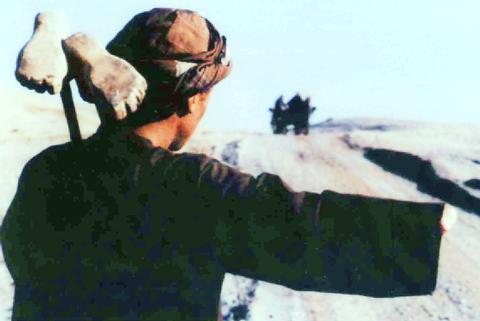In one of the early scenes in Kandahar, which plays tonight at the Golden Horse Film Festival at 11:30pm, a man whose family has just been robbed of all their possessions by knife-wielding bandits mutters bitterly: "There's only death and destruction in Afghanistan." The line is one of many in this film that carries particularly strong resonance given the ongoing war in the country and underscores how this movie is without a doubt the timeliest film in the festival's lineup.
Kandahar, by Iranian director Mohsen Makhmalbaf, traces the journey of an Afghan exile from Canada, Nafas, who returns to her native land in an attempt to rescue her sister who has sent a letter expressing her deep despair and intention to kill herself at an upcoming eclipse. The trip to the heart of Taliban territory makes for a one-of-a-kind road movie that exposes Afghanistan's pitiful humanitarian, economic and social crises.
The opening scene features Nafas, played brilliantly by Nelofer Pazira, at a refugee camp on Iran's border with Afghanistan, where girls who are about to return to their country are being told that they will not be allowed to attend school as they had at the camp and that they will be forced to remain in their homes. "But," the teacher says, "the world will hear your calls and come to your aid."

PHOTO COURTESY OF GOLDEN HORSE FILM FESTIVAL
This a feminist film and oppression against women is a theme that carries throughout, with frequent shots that seem either to be angled in a way to peer up women's veils, or burkhas, or through the tight lace grid through which the women can see. The imagery is not subtle, but drives home the point that the restrictions placed on people's everyday lives by the Taliban's version of Islamic law, or Shariah, have hit women the hardest, leaving them virtually invisible.
Though the plight of women in Afghanistan is the main thrust of the story, the impression of complete social collapse in the country is no less powerful. A sense of menace permeates the film, as the family with which Nafas first travels is robbed, her second young escort abandons her briefly in the desert, and her third guide, an African-American doctor who carries a gun for protection says bluntly: "Everyone here is a threat or an opportunity." Nafas is later forced to try to complete her journey to Kandahar as part of a wedding procession, which is eventually stopped by gruff Taliban soldiers who confiscate musical instruments and a book and will likely take away Nafas' tape recorder as well. We never know what happens to the tape recorder or to Nafas, though.
Ironically, the violence in the movie is merely insinuated. Women are never beaten, no one is killed or hurt, but danger always seems to lurk just over the next dune.

PHOTO COURTESY OF GOLDEN HORSE FILM FESTIVAL
There are plenty of reminders of violence, however. Boys being schooled by a mullah at the first village Nafas enters are drilled in equal measure on the Koran and on the use of their AK-47s. And at one point, Nafas happens upon a Red Cross clinic for land-mine victims in the middle of the desert. The men who hop about outside the hospital tents in the dust are a pathetic sight, complaining of the pain in the half-healed stumps that used to be their legs. When a UN relief-delivery plane flies overhead, dropping prosthetic legs on parachutes, the group of crippled men take off on their crutches in a surreal, frenzied dash to gather them up, their eyes fixed on the plane and falling legs, as if looking to the heavens for salvation.
Despite the maimed people, the widows and the poverty, Makhmalbaf manages to tell a captivating story that is not without its light moments. One of the land mine victims, who cons the Red Cross nurses into giving him a pair of prosthetic legs, is a natural comedian. The women, who sing cheerfully on the way to the wedding and even apply make-up under their burkhas, also show signs that their spirits are not so easily broken. These brief glimmers of hope are some of the film's most powerful images.
Like most road movies, Kandahar is structured as a race against time, which makes the journey especially hopeless in Afghanistan and highlights how out of place Nafas is in her native country. She constantly reminds her guides of her haste in reaching Kandahar, but they mostly reply with a shrug of their shoulders, as if the notion of time were incomprehensible to them.
The settings, the clothes and the music all could have been taken from centuries ago and add to the impression that Afghanistan is a place out of time. The gun-toting American doctor comments that "weapons are the only modern things in Afghanistan," as if the point needed any further emphasis.
Even before the Taliban forbade TV, radio, movies and anything else that was considered entertainment or contained images of people, few images of life in Afghanistan made it out of the country. The war taking place there now has inundated the world with images of the country, but these are simply a greater volume of the trickle that came before -- men with guns, children with distended bellies and piles of rubble where there used to be homes. Kandahar includes all these, but by telling a story the movie puts a human face to them and adds some much-needed complexity to the general view of Afghanistan as simply a problem. Kandahar is a visually beautiful film, to which current circumstances have added powerful urgency.
The film would be significant as yet another exceptional film in Iran's burgeoning cinema, but with the war it is also a must-see for anyone wishing for a deeper understanding of the country that is currently the focus of world attention.

On April 26, The Lancet published a letter from two doctors at Taichung-based China Medical University Hospital (CMUH) warning that “Taiwan’s Health Care System is on the Brink of Collapse.” The authors said that “Years of policy inaction and mismanagement of resources have led to the National Health Insurance system operating under unsustainable conditions.” The pushback was immediate. Errors in the paper were quickly identified and publicized, to discredit the authors (the hospital apologized). CNA reported that CMUH said the letter described Taiwan in 2021 as having 62 nurses per 10,000 people, when the correct number was 78 nurses per 10,000

As we live longer, our risk of cognitive impairment is increasing. How can we delay the onset of symptoms? Do we have to give up every indulgence or can small changes make a difference? We asked neurologists for tips on how to keep our brains healthy for life. TAKE CARE OF YOUR HEALTH “All of the sensible things that apply to bodily health apply to brain health,” says Suzanne O’Sullivan, a consultant in neurology at the National Hospital for Neurology and Neurosurgery in London, and the author of The Age of Diagnosis. “When you’re 20, you can get away with absolute

May 5 to May 11 What started out as friction between Taiwanese students at Taichung First High School and a Japanese head cook escalated dramatically over the first two weeks of May 1927. It began on April 30 when the cook’s wife knew that lotus starch used in that night’s dinner had rat feces in it, but failed to inform staff until the meal was already prepared. The students believed that her silence was intentional, and filed a complaint. The school’s Japanese administrators sided with the cook’s family, dismissing the students as troublemakers and clamping down on their freedoms — with

As Donald Trump’s executive order in March led to the shuttering of Voice of America (VOA) — the global broadcaster whose roots date back to the fight against Nazi propaganda — he quickly attracted support from figures not used to aligning themselves with any US administration. Trump had ordered the US Agency for Global Media, the federal agency that funds VOA and other groups promoting independent journalism overseas, to be “eliminated to the maximum extent consistent with applicable law.” The decision suddenly halted programming in 49 languages to more than 425 million people. In Moscow, Margarita Simonyan, the hardline editor-in-chief of the